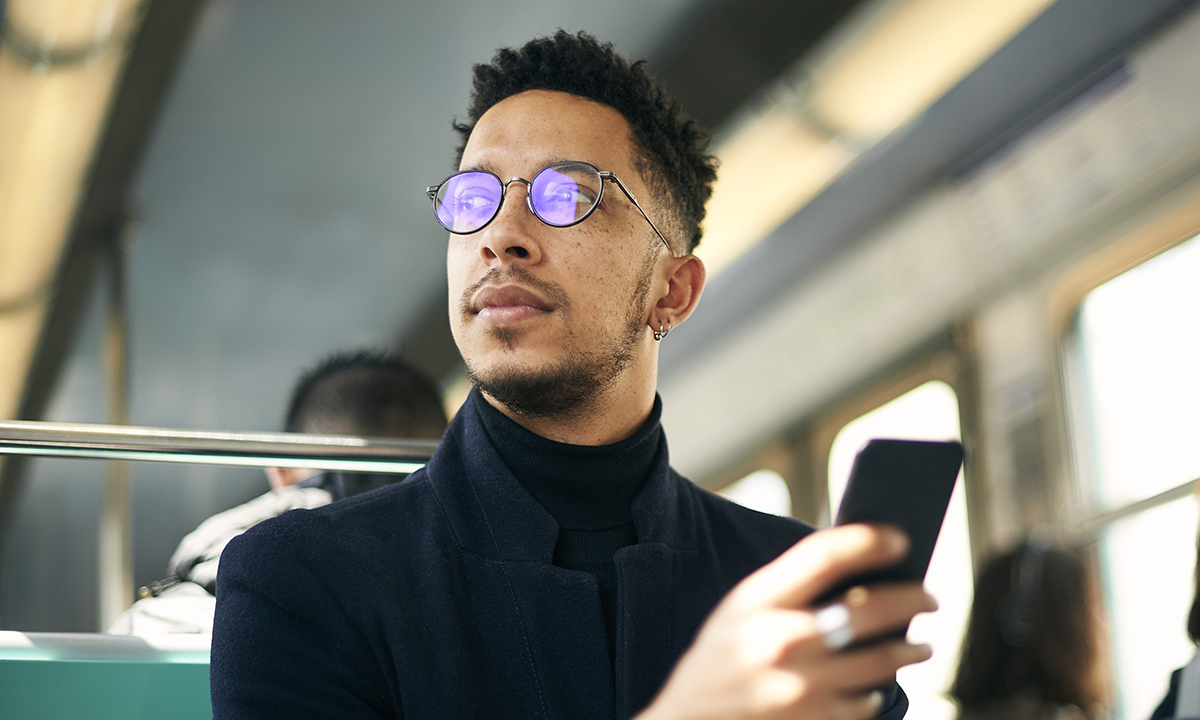
蓝光过滤眼镜经常被称为蓝光眼镜,被宣传成能够解决长时间使用电子产品所造成的后果。尤其是自新冠疫情爆发以来,蓝光眼镜热销,人们希望蓝光眼镜可以减少使用电脑、平板和iPhone手机时的蓝光接触。
哈佛医学院(Harvard Medicine)认为,白天蓝光有助于聚焦和改善情绪,但晚上会干扰睡眠,抑制睡眠激素褪黑素分泌。蓝光还会导致眼睛疲劳和不适。因此,人们一直希望通过蓝光过滤眼镜,能够安然入眠并减少视疲劳。虽然日光是蓝光的主要来源,但过度使用电子设备让人们开始担心起蓝光接触水平。
但一项新研究显示,蓝光眼镜的各种所谓好处并不明确。
8月17日,《科克伦系统评价数据库》(Cochrane Database of Systematic Reviews)发表了一篇论文。研究人员对6个国家17项随机对照试验进行分析发现,与无法过滤蓝光的眼镜相比,蓝光眼镜可能无法改善视疲劳;至于蓝光眼镜对睡眠或白天警觉性的影响,目前尚无定论。
论文的作者、澳大利亚维多利亚省墨尔本大学(University of Melbourne)唐尼实验室眼前部、临床试验与研究翻译部(Downie Laboratory: Anterior Eye, Clinical Trials and Research Translation Unit)的负责人劳拉·唐尼博士在新闻稿中说:“过去几年,关于蓝光过滤眼镜对于眼科诊疗是否有意义这个问题,人们展开了激烈讨论。研究显示,许多地方经常给患者配蓝光眼镜,有各种营销内容宣传它们的潜在好处。但我们根据当前最可靠的证据进行评估的结果显示,这些证据无法得出任何结论,也不能明确支持这些营销主张。”
虽然许多人高度重视改善自身的健康和表现,但蓝光眼镜的价格可能与它们的价值不符。唐尼希望可以引起专业人士和消费者的重视,而且根据这项研究的结果,她并不赞同为普通民众配蓝光眼镜。
唐尼还指出,蓝光眼镜是否会影响视力和睡眠质量以及长期视网膜健康,目前“仍不确定”。此外,关于蓝光眼镜与其他眼镜在对比敏感度、辨色能力、不适眩光、黄斑健康、血清褪黑素水平或患者整体视觉满意度等方面的差异,也没有相关信息。
证据模糊
2021年,美国眼科学会(The American Academy of Ophthalmology)网站上的一篇文章称:“没有科学证据证明数码设备释放的蓝光会对眼睛造成损害。”美国眼科学会的发言人拉胡尔·库拉纳博士表示,文章里还提到,许多人之所以感觉眼睛疲劳,可能与数码视觉疲劳有关,因为我们在滚动屏幕时,会减少眨眼次数。
减少眼睛疲劳的方法
专家称,有一些方法无需配戴眼镜就能够改善视觉舒适度,例如改变眼睛注视的物品类型或转换视野等。一整天盯着电脑屏幕,只使用了部分视力。眨眼很重要,可以尝试“20-20-20”规则,即每20分钟看20英尺(约6.096米)以外的某个物品,持续20秒。
减少使用电子产品的时间,并在使用电子产品时调低屏幕亮度。
没有实质性伤害
虽然研究人员并未发现蓝光眼镜有任何明显的好处,但他们也没有发现配戴蓝光眼镜会产生任何严重的后果(戴眼镜普遍会引起的头痛和不适除外)。然而,有一个关键的限制因素是试验的持续时间存在差异,对蓝光眼镜或非蓝光眼镜的评估在配戴后一天至五周期间完成。每项试验的样本数量从5人到156人不等。因此,该团队仅提出了与短期使用有关的结论。
论文的作者之一、来自唐尼实验室的苏美尔·辛格博士在新闻稿中表示,研究人员希望未来可以就蓝光眼镜对睡眠、眼睛健康等方面的影响,进行更多的研究。
他说:“研究人员应该研究不同群体配戴蓝光眼镜和[使用]不同类型镜片在疗效和安全性结果方面是否存在差异。”(财富中文网)
译者:刘进龙
审校:汪皓
蓝光过滤眼镜经常被称为蓝光眼镜,被宣传成能够解决长时间使用电子产品所造成的后果。尤其是自新冠疫情爆发以来,蓝光眼镜热销,人们希望蓝光眼镜可以减少使用电脑、平板和iPhone手机时的蓝光接触。
哈佛医学院(Harvard Medicine)认为,白天蓝光有助于聚焦和改善情绪,但晚上会干扰睡眠,抑制睡眠激素褪黑素分泌。蓝光还会导致眼睛疲劳和不适。因此,人们一直希望通过蓝光过滤眼镜,能够安然入眠并减少视疲劳。虽然日光是蓝光的主要来源,但过度使用电子设备让人们开始担心起蓝光接触水平。
但一项新研究显示,蓝光眼镜的各种所谓好处并不明确。
8月17日,《科克伦系统评价数据库》(Cochrane Database of Systematic Reviews)发表了一篇论文。研究人员对6个国家17项随机对照试验进行分析发现,与无法过滤蓝光的眼镜相比,蓝光眼镜可能无法改善视疲劳;至于蓝光眼镜对睡眠或白天警觉性的影响,目前尚无定论。
论文的作者、澳大利亚维多利亚省墨尔本大学(University of Melbourne)唐尼实验室眼前部、临床试验与研究翻译部(Downie Laboratory: Anterior Eye, Clinical Trials and Research Translation Unit)的负责人劳拉·唐尼博士在新闻稿中说:“过去几年,关于蓝光过滤眼镜对于眼科诊疗是否有意义这个问题,人们展开了激烈讨论。研究显示,许多地方经常给患者配蓝光眼镜,有各种营销内容宣传它们的潜在好处。但我们根据当前最可靠的证据进行评估的结果显示,这些证据无法得出任何结论,也不能明确支持这些营销主张。”
虽然许多人高度重视改善自身的健康和表现,但蓝光眼镜的价格可能与它们的价值不符。唐尼希望可以引起专业人士和消费者的重视,而且根据这项研究的结果,她并不赞同为普通民众配蓝光眼镜。
唐尼还指出,蓝光眼镜是否会影响视力和睡眠质量以及长期视网膜健康,目前“仍不确定”。此外,关于蓝光眼镜与其他眼镜在对比敏感度、辨色能力、不适眩光、黄斑健康、血清褪黑素水平或患者整体视觉满意度等方面的差异,也没有相关信息。
证据模糊
2021年,美国眼科学会(The American Academy of Ophthalmology)网站上的一篇文章称:“没有科学证据证明数码设备释放的蓝光会对眼睛造成损害。”美国眼科学会的发言人拉胡尔·库拉纳博士表示,文章里还提到,许多人之所以感觉眼睛疲劳,可能与数码视觉疲劳有关,因为我们在滚动屏幕时,会减少眨眼次数。
减少眼睛疲劳的方法
专家称,有一些方法无需配戴眼镜就能够改善视觉舒适度,例如改变眼睛注视的物品类型或转换视野等。一整天盯着电脑屏幕,只使用了部分视力。眨眼很重要,可以尝试“20-20-20”规则,即每20分钟看20英尺(约6.096米)以外的某个物品,持续20秒。
减少使用电子产品的时间,并在使用电子产品时调低屏幕亮度。
没有实质性伤害
虽然研究人员并未发现蓝光眼镜有任何明显的好处,但他们也没有发现配戴蓝光眼镜会产生任何严重的后果(戴眼镜普遍会引起的头痛和不适除外)。然而,有一个关键的限制因素是试验的持续时间存在差异,对蓝光眼镜或非蓝光眼镜的评估在配戴后一天至五周期间完成。每项试验的样本数量从5人到156人不等。因此,该团队仅提出了与短期使用有关的结论。
论文的作者之一、来自唐尼实验室的苏美尔·辛格博士在新闻稿中表示,研究人员希望未来可以就蓝光眼镜对睡眠、眼睛健康等方面的影响,进行更多的研究。
他说:“研究人员应该研究不同群体配戴蓝光眼镜和[使用]不同类型镜片在疗效和安全性结果方面是否存在差异。”(财富中文网)
译者:刘进龙
审校:汪皓
Blue light-filtering glasses—commonly referred to as blue light glasses—are touted for their supposed ability to combat the physical consequences of excessive screen time. The glasses have been become a popular purchase, especially since the pandemic, to reduce blue light exposure that comes from computers, tablets and iPhones.
According to Harvard Medicine, blue light can help boost focus and mood during the day but can disrupt sleep at night and suppress the release of melatonin—the sleep hormone. Blue light has also been blamed for eye strain and discomfort. As a result, people have been shelling out for blue light-filtering spectacles in hopes of snoozing in peace and reducing visual fatigue. Even though sunlight is the primary source of blue light, our excessive digital diets have made people wary of their levels of blue light exposure.
But new research says the suggested benefits of blue light glasses are fuzzy.
In an analysis of 17 randomized control trials from six countries, published in the Cochrane Database of Systematic Reviews on August 17, researchers found blue light glasses may not improve visual fatigue compared to glasses that do not filter out blue light; conclusions could not be drawn about their impact on sleep or daytime alertness.
“Over the past few years, there has been substantial debate about whether blue-light filtering spectacle lenses have merit in ophthalmic practice. Research has shown that these lenses are frequently prescribed to patients in many parts of the world and a range of marketing claims exist about their potential benefits,” Laura Downie, PhD, author of the study and head of the Downie Laboratory: Anterior Eye, Clinical Trials and Research Translation Unit, at the University of Melbourne, Victoria, Australia, said in a press release. “The outcomes of our review, based on the current, best available evidence, show that the evidence is inconclusive and uncertain for these claims.”
While optimizing our health and performance is top of mind for many, the glasses might not be worth the money. Downie hopes professionals and consumers take note, adding that as a result of the findings, she does not endorse prescribing blue light glasses to the general public.
Downie also says it is “unclear” whether blue light glasses impact vision and sleep quality, as well as long-term retinal health. There was also a lack of information about the differences between the glasses regarding contrast sensitivity, color discrimination, discomfort glare, macular health, serum melatonin levels, or overall patient visual satisfaction.
The evidence is blurry
A 2021 article on the The American Academy of Ophthalmology website says, “there is no scientific evidence that blue light from digital devices causes damage to your eye.” The article adds that the eye strain many of us feel is probably tied to digital strain because we tend to blink less when scrolling, according to Dr. Rahul Khurana, a spokesperson for The American Academy of Ophthalmology.
Ways to reduce eye strain
Experts say there are ways to improve visual comfort without the glasses: Vary the types of things you are focusing on, or your field of vision. Looking at a computer all day only engages a specific part of your vision. It’s also important to blink and try the “20-20-20” rule: every 20 minutes, look at an object 20 feet away for 20 seconds.
Limit screen time overall, and dim the brightness levels when you can.
No harm, no foul
While researchers found no notable benefits to blue-light glasses, they didn’t find any key harmful consequences of using them either (besides the potential headaches and discomfort associated with wearing glasses in general). However, a key limitation is the duration of the trials, with assessment between one day to five weeks after wearing either the blue light or non-blue light glasses. The sample sizes also ranged from five to 156 per trial. Due to this, the team only made conclusions about short-term use.
The researchers hope to conduct further research on the effects of blue light glasses on sleep, eye health, and more, Dr. Sumeer Singh, an author on the study from the Downie Laboratory, said in the press release.
“They should examine whether efficacy and safety outcomes vary between different groups of people and [use] different types of lenses,” he said.






